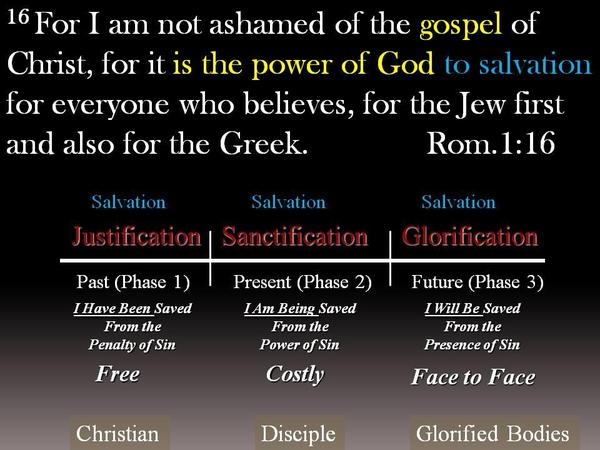Hi to my Forum Friends,
In the discussion begun by my Roman Catholic Friend, David, titled "Can You Be Saved And Lose Eternal Life?" -- she tells us, "Those who read the record of the Gospels carefully will find repeated authority from Jesus to renounce the doctrine of eternal security. In Luke 12:42-46 Christ described in another parable how a faithful servant could turn into an unfaithful one. After asking, 'Who then is that faithful and wise steward, whom his lord shall make ruler over his household. . .'
Jesus answers His own question: 'That servant, whom his lord when he cometh shall find so doing . . . he will make him ruler over all that he hath.' Then Christ explains how that servant could lose his reward."
Please notice what my Friend has written -- "that servant could lose his reward." That is what I have always written. ALL believers will stand before Jesus Christ at the Believer's Judgment, a judgment of rewards, or lack of rewards. As we are told in 1 Corinthians 3:15, a believer who has been a lazy "couch potato" believer will see his/her works burn up -- yet, he/she will be saved. In other words, that lazy believer will receive few, if any, rewards. But, his/her greatest reward -- that of eternal life in the presence of God -- is not lost. Rewards in heaven are lost. Salvation is not lost.
And, she tells us, "Those who read the record of the Gospels carefully will find repeated authority from Jesus to renounce the doctrine of eternal security."
I cannot find those Scripture references. But, I can find a number of Scripture references where He tells us that we will not and cannot lose our eternal life, our eternal security, our salvation.
John 3:16, "For God so loved the world, that He gave His only begotten Son, that whoever believes in Him shall not perish, but have eternal life."
John 5:24, "Truly, truly, I say to you, he who hears My word, and believes Him who sent Me, has eternal life, and does not come into judgment, but has passed out of death into life."
John 6:47, "Truly, truly, I say to you, he who believes has eternal life."
John 10:27-29, "My sheep hear My voice, and I know them, and they follow Me; (28) and I give eternal life to them, and they will never perish; and no one will snatch them out of My hand. (29) My Father, who has given them to Me, is greater than all; and no one is able to snatch them out of the Father's hand."
John 11:25-26, "Jesus said to her, 'I am the resurrection and the life; he who believes in Me will live even if he dies, (26) and everyone who lives and believes in Me will never die. Do you believe this?' "
John 14:1-3, "Do not let your heart be troubled; believe in God, believe also in Me. (2) "In My Father's house are many dwelling places; if it were not so, I would have told you; for I go to prepare a place for you. (3) If I go and prepare a place for you, I will come again and receive you to Myself, that where I am, there you may be also."
These are just a few from only one Gospel, but I will stop here, for how many different ways can Jesus Christ promise eternal life to believers? I believe you will agree with me that HAS means HAS, HAVE means HAVE, NO ONE means NO ONE, and NEVER means NEVER.
I would say that Jesus Christ is quite clear that those who believe in Him and His finished work on the cross, and have received Him as Lord and Savior -- HAVE eternal life in Him. And NO ONE can snatch us out of His hands, nor out of the Father's hands. That, my Friend, is most certainly "eternal security" or as some call it "once saved, always saved."
Then, I asked my Friend if she will answer two questions for me:
1. What do you believe a person must do to be saved, to have eternal life in Christ?
2. Which sin or sins do you believe will cause a Christian believer to lose his/her eternal salvation?
She tells me, "Bill, We have been saved by the death of Jesus Christ. While we were still sinners, Jesus’ death canceled the bond that stood against us (Colossians 2:14)."
Yes, while we were still sinners, Jesus Christ came in human form to pay the debt to God which we can never pay. His blood spilled upon the cross atoned for all of the sins, past, present, and future, for all people who will, by grace, through faith in His finished work on the cross -- believe and receive His gift of eternal life. On this, we agree.
Yet, when you tell me, "While we were still sinners, Jesus’ death canceled the bond that stood against us (Col. 2:14)" -- I do not believe you have taken that to its required and full conclusion.
What you have written is true, that Christ died to offer eternal life to all people. But, it is only applicable WHEN a person believes and receives (John 1:12) His "paid in full" free gift of life.
Colossians 2:13-14, "When you were dead in your transgressions and the uncircumcision of your flesh, He made you alive together with Him, having forgiven us all our transgressions, (14) having canceled out the certificate of debt consisting of decrees against us, which was hostile to us; and He has taken it out of the way, having nailed it to the cross."
Jesus Christ took the sins of all people to the cross with Him. That is why the sky went dark for three hours (Luke 23:44, Matthew 27:45-46), for God turned His back upon Jesus, not being able to look upon such sin. Yet, not all people will reap the eternal life benefit of that divine sacrifice. Here, you may ask, "If not all people, then who will be saved?"
Who will be saved? Only those Old Testament saints who by faith believed God; and those New Testament saints, the church, who have believed and received Him as Lord and Savior; and those Tribulation saints who will believe and receive Him during the horrible seven year Tribulation, and Millennium saints, those born during His Millennial Reign who will believe and receive Him as Lord and Savior. These are the groups who have or will receive eternal life in Christ.
However, all people down through the ages who deny God, who deny Jesus Christ -- and die in their sin of unbelief -- will receive their self-imposed eternal condemnation.
Jesus Christ paid the full pardon for our sins. But, like a prisoner still sitting in a jail cell after a full pardon has been paid -- if that person will not accept His full pardon and walk out of the Sin Jail Cell (believe and repent), he/she is still a slave to that sin which condemns -- and still under self-imposed eternal condemnation.
If you are a broke, homeless person living on the streets, and Bill Gates comes to you and offers you one billion dollars -- if you will not accept and receive that money, you are still a broke, homeless person living on the streets. However, if when Bill Gates offers, you will accept his free gift -- you will live in luxury.
The same is true of the free gift of eternal life Jesus Christ offers us. If we will not accept His free gift of life -- we are still lost in the world and condemn ourselves. But, if, and when, we receive His free gift -- we are assured of eternal life. "He who believes HAS eternal life" (John 6:47).
Jesus Christ paid our pardon. But, we have to accept and receive it -- or we have nothing. However, once we do receive it -- we HAVE eternal life in Him.
Then, my Friend tells me, "In other words, the guilt of original sin has been wiped away."
The original sin was committed by Adam, when he chose to disobey God. Since then, all of his descendants have inherited the Adamic Sin Nature. And, that sin nature cannot be wiped away as long as we live in this mortal body.
What Is The Sin Nature?
http://www.gotquestions.org/sin-nature.html
The reality of a sin nature is clearly seen in human behavior. . . The Bible provides the answer as to why every person sins. Scripture says that God created humankind originally good and without a sin nature: "Then God said, 'Let Us make man in Our image, according to Our likeness'. . . . God created man in His own image, in the image of God He created him; male and female He created them” (Genesis 1:26-27).
However, Genesis chapter 3 records the fall of Adam and Eve, and with that fall, sin entered into the two previously sinless creatures that God had made. And when they, in turn, had children, their sin nature was passed along to their offspring. That sin nature immediately manifested itself in the very first man born from Adam and Eve, a man named Cain who became a murderer (Genesis 4:8).
Instead of only the image of God being passed down through the human procreation process, a sin nature was passed as well: “When Adam had lived one hundred and thirty years, he became the father of a son in his own likeness, according to his image, and named him Seth” (Genesis 5:3).
The Old Testament prophets also affirmed that a sin nature exists in everyone born of human parents. Jeremiah said, “The heart is more deceitful than all else and is desperately sick; who can understand it?” (Jeremiah 17:9). The prophet Isaiah stated: "For all of us have become like one who is unclean, and all our righteous deeds are like a filthy garment; And all of us wither like a leaf, and our iniquities, like the wind, take us away” (Isaiah 64:6).
In the New Testament, Paul affirms an inherited sin nature when he says, "Therefore, just as through one man sin entered into the world, and death through sin, and so death spread to all men, because all sinned” (Romans 5:12). And the Apostle John says this to his readers: "If we say that we have no sin, we are deceiving ourselves and the truth is not in us” (1 John 1:8).
Bill Gray Note: Bold, italic, and underline emphasis in the article above is mine.
When we receive Jesus Christ as Lord and Savior, we are indwelled and sealed by the Holy Spirit (Ephesians 1:13) until the day of our redemption (Ephesians 4:30), which is the day we either die in this mortal body or are raptured from this mortal body. Until that day, we will always have the sin nature (1 John 1:8). It is not the "original sin" since that belongs to Adam -- but, it is the imputed, or inherited, sin of Adam passed down to all of us.
Next, she tells me, "God pardoned our sins. But being pardoned isn’t the same as being holy. Being pardoned gives us back our freedom to choose the road to holiness, to walk the narrow path."
You are confusing the gift of "free will" which God has given to all people -- with the atoning pardon Jesus Christ purchased for all people on the cross. That atoning pardon is available to all people; but, not all will receive it. The God-given faculty of "free will" allows each person to make a personal choice: Choose to follow Jesus Christ into life eternal, or choose to deny Him and follow the world into eternal condemnation. This gift of "free will" not only allows one to choose; it mandates that everyone MUST make a choice -- eternal life or eternal condemnation.
True, through His finished work on the cross, i.e., "It is finished!" (John 19:30) -- Jesus Christ "paid in full" the pardon for all people. But, that pardon is valid ONLY if and when we accept it. If we continue to deny him and refuse to accept His pardon; we are still in our Sin Prison Cell, never to leave it without Him.
Then, she writes, "But being pardoned isn’t the same as being holy."
Well, in a way, they are sort of the same thing. Christ purchased a pardon for all people. Yet, we are not pardoned until we accept and receive that "paid in full" pardon He purchased for us. The moment we do receive Him as Lord and Savior, we are free to leave that Sin Prison Cell and walk free. That is what it means to be pardoned -- we are separated from the sin conviction which held us in our Sin Prison Cell.
To be "pardoned" is to be set apart from our sin. To be "holy" means to be "set apart for Him." If we do not accept and receive His "full pardon," His free gift (Ephesians 2:8-9) of eternal life -- we are not set apart for Him. When we do receive His pardon, we are that moment set apart for Him.
The Bible teaches that God is a holy God. . . Because only God is holy, any people or objects that are said to be holy are described in this manner because God has made them holy, or (because He has) set them apart. Therefore the term holy is applied to persons or objects that have some type of relationship with the Lord – they are set apart for His service. (http://www.blueletterbible.org.../stewart.cfm?id=1284)
What happens when accept His pardon and become Christ Followers?
Titus 3:3-5, "For we also once were foolish ourselves, disobedient, deceived, enslaved to various lusts and pleasures, spending our life in malice and envy, hateful, hating one another. (4) But when the kindness of God our Savior and His love for mankind appeared, (5) He saved us, not on the basis of deeds which we have done in righteousness, but according to His mercy, by the washing of regeneration and renewing by the Holy Spirit."
1 Corinthians 6:11, "Such were some of you; but you were washed, but you were sanctified, but you were justified in the name of the Lord Jesus Christ and in the Spirit of our God."
Question: "What is regeneration according to the Bible?"
http://www.gotquestions.org/regeneration-Bible.html
Answer: Another word for regeneration is rebirth, from which we get the phrase “born again.” To be born again is opposed to, and distinguished from, our first birth, when we were conceived in sin. The new birth is a spiritual, holy, and heavenly birth signified by a being made alive in a spiritual sense.
Regeneration is part of the "salvation package," if you will, along with sealing (Ephesians 1:14), adoption (Galatians 4:5), reconciliation (2 Corinthians 5:18-20), and many other salvation concepts. Being born again, or born from above, is parallel to regeneration (John 3:6-7; Ephesians 2:1; 1 Peter 1:23; John 1:13; 1 John 3:9; 4:7; 5:1, 4, 18). Simply put, regeneration is God making a person spiritually alive, a new creation, as a result of faith in Jesus Christ.
Question: "What is sanctification? What is the definition of Christian sanctification?" http://www.gotquestions.org/sanctification.html
Answer: Jesus had a lot to say about sanctification in the Book of John, chapter 17. In verse 16 the Lord says, “They are not of the world, even as I am not of the world,” and this is before His request: “Sanctify them in the truth: Thy word is truth.”
Sanctification is a state of separation unto God; all believers enter into this state when they are born of God: “But of Him you are in Christ Jesus, who became for us wisdom from God -- and righteousness and sanctification and redemption” (1 Corinthians 1:30). This is a once-for-ever separation, eternally unto God. It is an intricate part of our salvation, our connection with Christ (Hebrews 10:10).
Question: "What is justification?"
http://www.gotquestions.org/justification.html
Answer: Simply put, to justify is to declare righteous, to make one right with God. Justification is God’s declaring those who receive Christ to be righteous, based on Christ’s righteousness being imputed to the accounts of those who receive Christ (2 Corinthians 5:21). Though justification as a principle is found throughout Scripture, the main passage describing justification in relation to believers is Romans 3:21-26: “But now a righteousness from God, apart from law, has been made known, to which the Law and the prophets testify. This righteousness from God comes through faith in Jesus Christ to all who believe. . . "
Finally, my Friend, you tell me, "Right now, today, we are being saved. Grace is wooing us down the narrow path. We are becoming holy. Salvation is an ongoing event."
Yet, Ephesians 1:13 tells us, "In Him, you also, after listening to the message of truth, the Gospel of your salvation -- having also believed, you were sealed in Him with the Holy Spirit of promise."
When the Holy Spirit indwells and seals a person -- at that moment, that person has salvation. Indwelling and sealing are not a process -- but, an event which happens when that person, by grace, through faith -- believes and receives Jesus Christ as Lord and Savior. It is not a process. It is BOOM, you heard the Gospel, you believed the Gospel, you asked Jesus Christ into your heart (Revelation 3:20) -- and you are saved. Jesus Christ does not slowly creep into your heart. The moment you open the door of your heart (Revelation 3:20) and invite Him to come in and be your Best Friend -- He is there!
Then, according to Ephesians 1:13 and 4:30, we are indwelled and sealed until the day of our redemption. When is the day of our redemption? It is the day our Redeemer Kinsman, Jesus Christ, comes for us (John 14:1-3) -- either at the death of our mortal body -- or at the rapture of us from our mortal body.
No, my Friend, salvation is not an ongoing process; it is a one-time event. However, then, living the Christian life becomes an ongoing process which does not end until we are redeemed by our Redeemer Kinsman, Jesus Christ.
God bless, have a wonderful, blessed day,
Bill
















